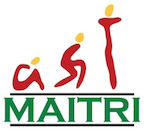Maitri's Immigration Program Since 2011
By Dr. Zakia Afrin, Director, Survivor Advocacy
If I were to sum up the understanding I gained from 10 years of service to survivors of domestic violence in Maitri immigration program in one sentence, this would be it: Immigration reform cannot solely focus on self-petitioning options for victims and survivors instead, addressing domestic violence needs a thorough overhaul and comprehensive reform of the system.
There was no single moment of truth or an “aha moment”as we call it to this observation. It sipped into me gradually over the years from the life events described by survivors, resilience of women standing up against the criminal justice systems, refusing to let go off the compassion they never received from their abusive partners, and hesitancy of putting oneself before the need of the family, nuclear or extended. In a way it seems like the past ten years has raised more questions for Maitri than it has answered.
As a natural extension of services for immigrant survivors, Maitri became a Board of Immigration Appeals recognized organization in 2011. It was a bold move on our part, bringing in the complexities of immigration in the small operation we had at that time. Yet, it was necessary. Most of the callers reaching out for help had at least one if not more immigration related concerns. “Can I call for help? I am not a citizen here. Is he going to be deported if I go to court? Is he going to lose his immigration status and job?” were the most asked questions at the helpline and it continues to be so in 2022. It was important to offer appropriate legal advice and to have the authorization to represent in many such complex situations and we went for the recognition and accreditation of Maitri staff allowing us to do just that. I must express my gratitude to Jack Holmgren of CLINIC, Indu Liladhar Hathi and Maitri leadership for believing in this step which elevated Maitri as the first domestic violence service provider in Santa Clara County to start in-house immigration assistance.
From the very first month it became evident that we were headed in the right direction in providing holistic support for survivors. Basic immigration related safety planning became part of our helpline conversations. Knowing the uncertainties a victim/survivor feels about her immigration status, the we were able to address these insecurities while safety planning. We are able to look at different options for self-petitions where applicable and offer, when possible, to represent the survivor throughout her immigration journey. Numerous survivors have received assistance from being temporary visa holders to becoming US citizens. As we continue to offer representation for VAWA self-petition, U visa, Asylum, work authorization for abused spouses, citizenship among other reliefs available for survivors, the conundrum looms large over our mission of transforming our communities. At a time when we are trying to move away from carceral system of addressing domestic violence, the immigration options for immigrant survivors continue to focus on their involvement in the criminal justice system or other systems ignoring the whole family wellbeing. Nowhere is this as blatantly exposed as in the case of U visa, which requires active participation of a victim/survivor in assisting the system to punish an individual. For the other categories as well some sort of action against the other person is preferred. Since inception Maitri has been receiving calls from our community to intervene in family conflicts. A recent research reiterated our findings: Survivors want community based intervention models where both parties can be involved in addressing abusive situations away from the criminal justice system. How is the current immigration relief for abused spouses honoring this preference? The short answer is: The current immigration relief is not taking into consideration how survivors feel about their relationships.
We keep trying to move away from asking survivors why they would not leave a relationship yet continue to ask that question through the systems in varying ways. The time is now to ask how we support immigrant women without compromising their status or their belief in giving their relationship another chance. Looking at stressors at immigrant families to prevent violence before it erupts and providing a social safety net for them may go further in addressing domestic violence together with offering legal status and economic empowerment solutions without ignoring the violence itself.
Yes, all domestic violence agencies must incorporate immigration assistance whenever possible and along with that advocate for policies that do not encourage punitive solutions to domestic violence. As we look ahead with the learnings from the past decade, we are committed to offering effective culturally responsive representation whenever required as well as push for immigration policy changes that takes individuals’ ‘holistic wellbeing into consideration.

